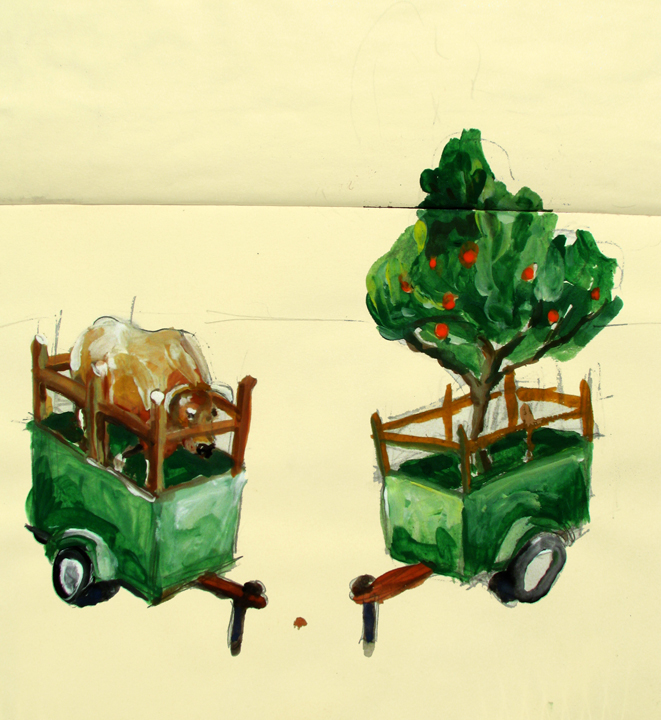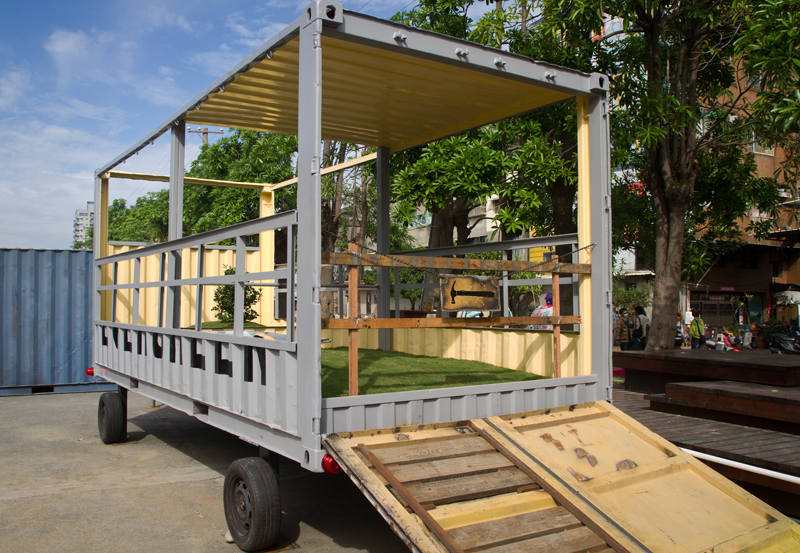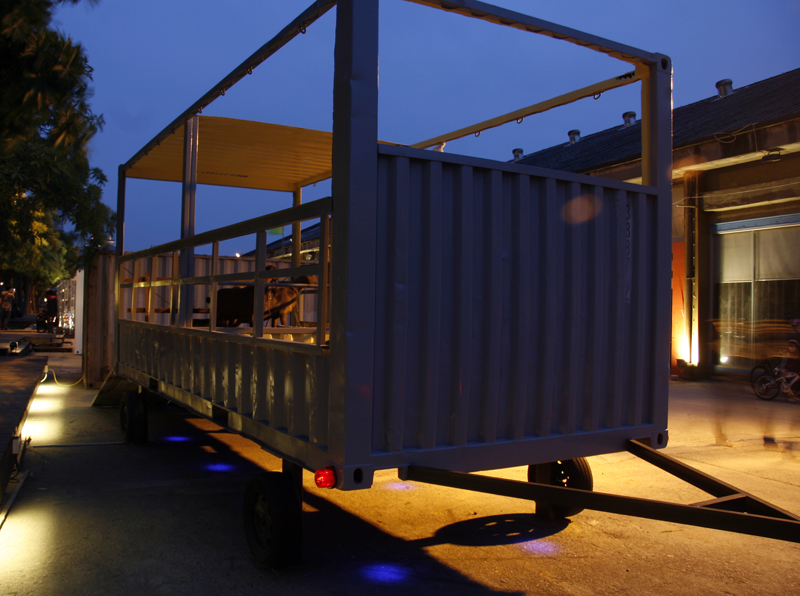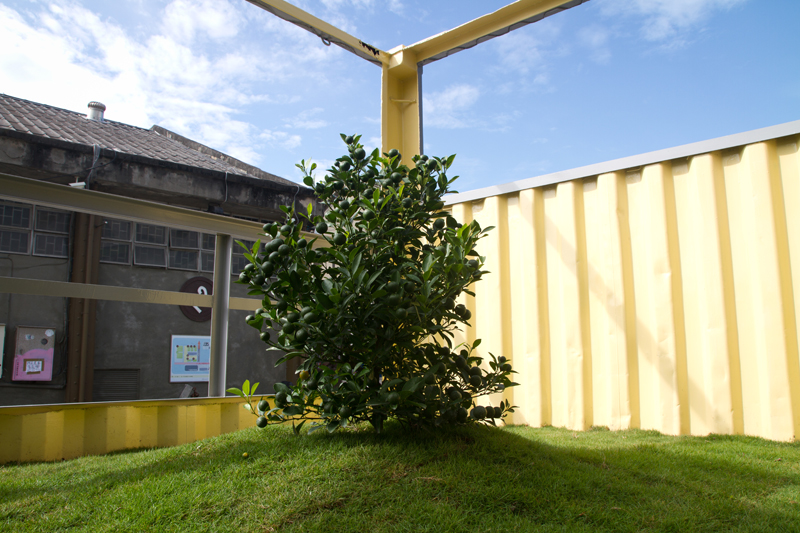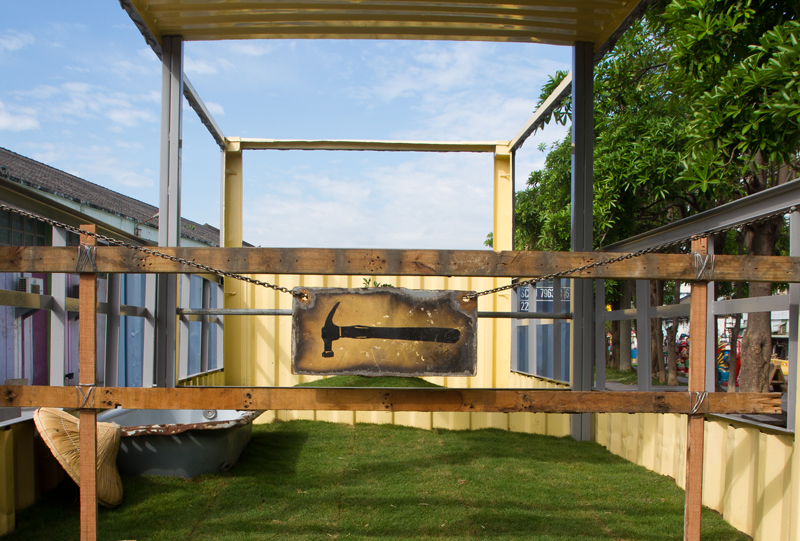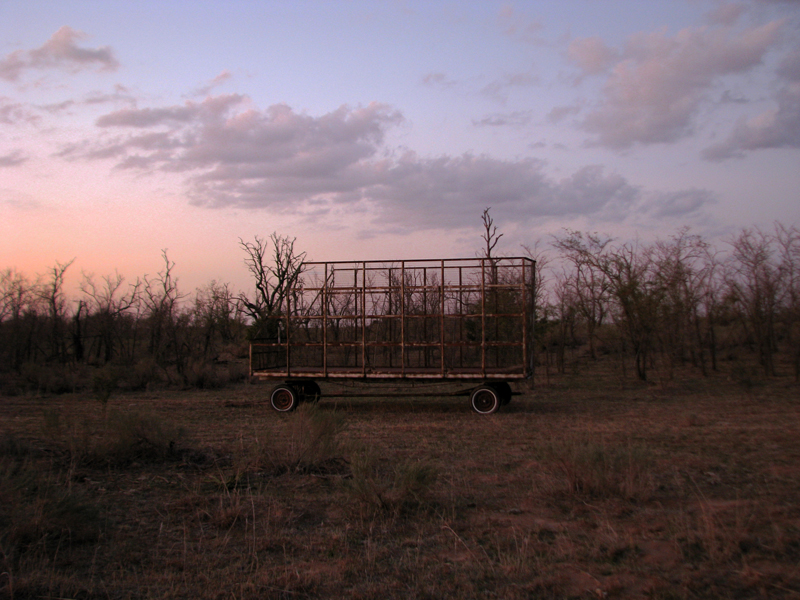“Just because we have the best hammer does not mean that every problem is a nail.” President Obama, downplaying the role of military action in U.S. global leadership during a major foreign-policy address at West Point’s 2014 Commencement. Thanks to President Obama’s and his commencement speech, the hammer is back!
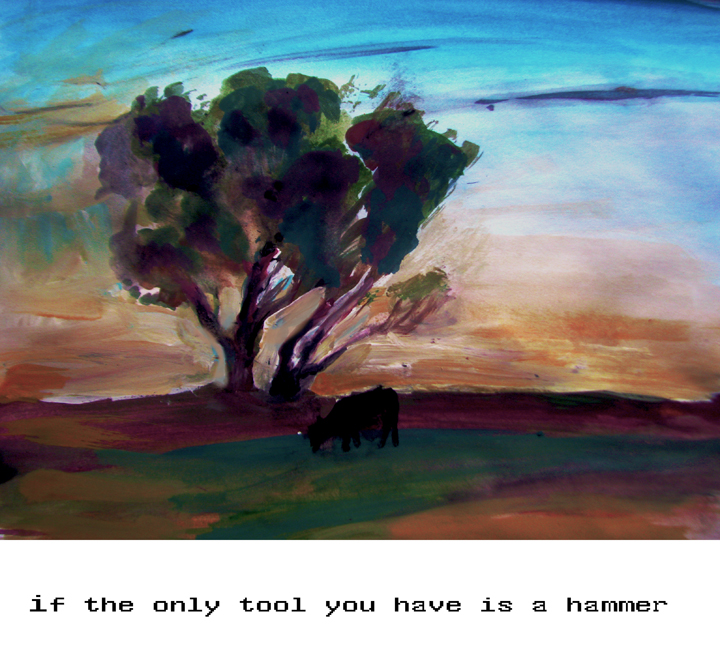 The theme for a shipping container that James and I finalized for the 2011 Kaohsiung International Container Arts Festival is titled “If the Only Tool You Have Is a Hammer”. The intention of our site installation was to transform a shipping container into a heroic, garage syndicated, trailer. The transformed seaworthy container became an osmotic conveyance, home to cow, orange tree, grass, dirt, water, sun, shade. The work subtly questioned the method and availability of food raised and produced in the world today. The title of the piece borrows from Abraham Maslow’s Law of the Instrument to describe habit vs. solution. Maslow makes an analogy to describe how man repeatedly relies on an available solution to solve multitudes of newly arising problems. In 1966 Maslow stated “It is tempting, if the only tool you have is a hammer, to treat everything as if it were a nail.” We live in such a world. With every tool a hammer and every problem a nail, is humanity able to construct an answer?
The theme for a shipping container that James and I finalized for the 2011 Kaohsiung International Container Arts Festival is titled “If the Only Tool You Have Is a Hammer”. The intention of our site installation was to transform a shipping container into a heroic, garage syndicated, trailer. The transformed seaworthy container became an osmotic conveyance, home to cow, orange tree, grass, dirt, water, sun, shade. The work subtly questioned the method and availability of food raised and produced in the world today. The title of the piece borrows from Abraham Maslow’s Law of the Instrument to describe habit vs. solution. Maslow makes an analogy to describe how man repeatedly relies on an available solution to solve multitudes of newly arising problems. In 1966 Maslow stated “It is tempting, if the only tool you have is a hammer, to treat everything as if it were a nail.” We live in such a world. With every tool a hammer and every problem a nail, is humanity able to construct an answer?
The idea for our trailer came from an attempt to link the irrational behavior sited in Maslow’s law of the hammer with the consequences of distancing ourselves from the Earth( nature). Our ability to design agriculture appears to have no ill effect, yet, as we correct nature to benefit man we lose connection to the Earth and sacrificing the planet to economic and ethical pressures, in a universe where Earth is, so far as we know, the only answer. Contemporary food production causes true food to become extinct and “true” life to be removed from the land. A living Earth cannot be converted into a field or energy source without disruption to its vitality. When we compare cows to oranges we are calling to mind their like histories. In fact, on some level, a cow and an orange have become one in the same thing: a modified link to an economized food chain. This nutritional imbalance is foretold by Rudolf Steiner and the culturists in the early 1900 planted gardens that were aligned to the cosmos. The shortcomings are also echoed in the work of the economist Friedrich von Hayek, writing during World War II, “…The increasing veneration for the state, the admiration of power, and of bigness for bigness’ sake, the enthusiasm for “organization” of everything (we now call it “planning”) and that inability to leave anything to the simple power of organic growth…” is the same economic hammer of food production.
“If the Only Tool You Have is a Hammer” project began with a simple observation. The Earth is home to all life. — It is life. Is there any other such place in the universe? The cow and the fruit tree inside a mobile piece of land, goes along with an understanding calculated to maintain an unplugged human population. Is it not true that we, almost as a rule, consistently choose to isolate ourselves from Earth looking for answers? We use self-improvement to show (a) man separate from the central balance of life. Our stationary trailer, with its planted habitat brings the cosmos home, to this place. (In the end, we switched a cow for goats and a mini orange tree for a fruit tree.)
“Talking to the Moon” is a beautiful book by a Native American, John Joseph Mathews. John was born in Pawhuska, Indian Territory, in 1894 and died there in 1979. The book was first published in 1945 and after out of print for more than 30 years, the book is being reissued. I like to quote one paragraph from the book to temporary rest our journey to the earth home:
The ground seems rich and fruitful in my yard as I dig with the sharpshooter spade. I dig more holes than I can ever fill with plants because the earth invites digging, and the feel of it and the odor of it inspire dreams. I plan a garden in the savage blackjacks each spring. Sitting in the wheelbarrow with my tools lying about, I dream of the garden beautiful as the wrens sing ecstatically about me, and that garden is a real ambition as I berate myself for the years wasted.


